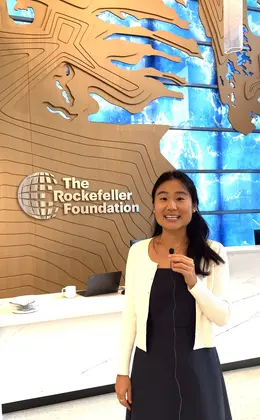Internship Spotlight: Margaret Kuo ’25, The Rockefeller Foundation
Margaret Kuo ’25 spent her summer working on digital initiatives for a large philanthropic organization.
We asked rising second-year MBA students to check in from their summer internships, where they applied the lessons of their first year at Yale SOM.

Internship: The Rockefeller Foundation, New York City
Hometown: I moved every few years growing up: Pittsburgh; Boston; Syracuse; Shanghai; Avon, Connecticut; Chicago; New York City
Pronouns: she/her/hers
The SOM classes you’re using on the job:Impact Measurement in the Social Sector, Narratives in Health Media
Go-to work lunch: The Rockefeller Foundation cafeteria! Lots of healthy and sustainable options.
After-work routine: Meet up with friends for a workout class, try a new restaurant for dinner, read
Favorite thing about internship city: I love how there’s always more to discover. I’ve been jogging around the Central Park loop every weekend, and just the other day I noticed a statue of a crouching jaguar peeking through the trees.
As a summer associate on The Rockefeller Foundation’s digital communications team, my work focused on leveraging the organization’s digital channels to educate, inspire, and unite people around its mission of advancing opportunity and reversing the climate crisis.
A key project I led was the social rollout of the annual impact report, which reflects what The Rockefeller Foundation achieved and learned in the past year. My contributions included developing messaging across LinkedIn, Meta, TikTok, and X to ensure the report reaches audiences across the globe.
Beyond the impact report, I amplified key foundation priorities through various digital initiatives. These include the “Matter of Impact” series, which spotlights the work of grantees; the Zero Gap Fund report, detailing the innovative finance team's impact investing portfolio; and the Green Power Gap report, outlining the need for an inclusive energy transition and roadmaps to get there.
Finally, I had the chance to create content for The Rockefeller Foundation’s website, specifically data visualizations for each of the focus areas. Each team is composed of subject-matter experts; I spent a lot of time digging into their work, and then translated that technical data into visualizations in order to help readers understand the “why” behind each team’s work.
I was drawn to The Rockefeller Foundation because of its track record in making opportunity universal. My parents grew up in poverty and worked extremely hard to get to where they are today, but it would not have been possible without their access to education and ensuing career prospects. In my summer internship, I wanted to understand how to drive change and scale it effectively. I felt that this organization, with its century-long track record of driving global transformation, was a place where I could learn best-in-class practices to do so.
As I learned more about The Rockefeller Foundation, I found myself resonating deeply with its approach to continuous learning and impact. It is committed to measuring its impact, learning from both successes and challenges, and openly sharing insights to foster open dialogue. Its work is dynamic, innovative, and ever-evolving, and I wanted to be able to sit in on those conversations and learn how an institution is able to ask itself difficult, thought-provoking questions.



SOM’s classes and extracurriculars prepared me well to succeed in my first nonprofit role. By joining the Social Impact Consulting club, the Yale Philanthropy Conference, and the Nonprofit Board Fellows, I learned how to zoom out, apply strategic frameworks to various business decisions, and consider both small- and large-scale implications. The core course Customer developed my ability to analyze branding and communications materials from an audience perspective. Impact Measurement in the Social Sector helped me understand how to define and articulate impact through theories of change, then translate data into compelling narratives. Lastly, the course Narratives in Health Media taught me to effectively communicate complex ideas about climate change and social impact to diverse audiences across various digital platforms.
I’ve also found the Yale alumni community to be an invaluable asset in my pivot to the nonprofit sector. Throughout the fall and spring of my first year, I connected with alumni across all levels and organizations in the nonprofit and philanthropy world. They were honest, helpful, and supportive. These conversations helped me build broad industry knowledge and gain insight into how my skills could translate into a new role. That made all the difference when I applied to the internship. I was able to clearly communicate how my skills and experiences from the for-profit sector could add value to a foundation. I was also able to develop a more nuanced understanding of The Rockefeller Foundation’s work, which allowed me to express why I wanted to intern there specifically.
My team members at The Rockefeller Foundation were some of the kindest, most passionate, and down-to-earth people that I’ve had the chance to work with. From the first day, they welcomed me with open arms, brought me onto live projects, encouraged me to share my thoughts, and allowed me to take ownership of initiatives important to the team’s work.
In addition, I benefitted from summer associate programming that convened about 20 interns, each on different teams across the organization. It was inspiring to meet such intelligent, mission-driven, and thoughtful individuals from graduate schools around the world. I learned something new every time I spoke with them and am grateful for the opportunity to broaden my perspective and build such a meaningful community.
I couldn’t recommend interning at The Rockefeller Foundation enough. As I head into my last year at the Yale School of Management, I’m excited to take courses such as “Interpersonal Dynamics,” “Modern Philanthropy,” and “Strategic Management of Nonprofit Organizations” to bridge theory and practice, and develop my skills to become a future leader in the social impact space.



